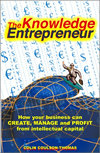 |
 |
|
 |
Working with Consultants
By Professor Colin Coulson-Thomas
Many business leaders have a love hate relationship with consultants.
While they may resent the high cost of ‘external inputs’ their
slimmed down organisations are often more dependent than ever upon bought
in advice as a result of no longer carrying a ‘float’ of resource
to cope with unforeseen events or major challenges.
Cynical consultants ingratiate themselves with chief executives, and encourage
dependency by encouraging them to doubt the competence of their internal
colleagues. Clients can end up paying large sums of money for ‘projects’
that do them little good, and sometimes cause great harm.
Many external consultants continually peddle new ideas to companies that
would benefit from traditional remedies. Tesco has prospered at the expense
of rivals by focusing unashamedly on the basics of successful retailing,
particularly the creation of greater value for customers, while at the
same time moving into on-line shopping and expansion overseas.
Many companies attach excessive credence to the counsel of external and
uninvolved experts, while paying little attention to the views of their
customers. The Shell.com website provides discussion group facilities
that allow the oil company to seek opinions from interested supporters
whether they are allies or critics. Their responses can be taken into
account when policies are reviewed.
So what do successful companies do differently from losers when working
with consultants? To answer this question a research and best practice
programme led by the author has examined the experience of over 2,000
companies. Research teams have examined key processes such as those for
winning business, building relationships and creating and exploiting knowledge.
The results are summarized in: ‘Transforming the Company, Manage
Change, Compete and Win’*.
Let’s start with losers in struggling, stagnant and failing companies.
They sometimes use consultants because they lack the energy and intellectual
rigour to themselves handle issues they are paid to confront. Insecurity
may also cause them to hire an outside party who can be blamed if events
do not turn out as planned.
Losers become dependents. They end up relying upon consultants to tell
them what to do and how to do it. They also take a short-term and project
view of relationships with consultants. There is little cross fertilisation
and limited learning across and between individual projects.
Many losers are fixed in their views, or think they know best, even though
their performance may suggest otherwise. They are resistant to new ideas
and alternative courses of action, and are reluctant to learn from outsiders.
Losers tend to fall back upon existing approaches and tried and tested
techniques. They adopt standard solutions, methodologies and packages,
and seek general improvements in performance rather than the achievement
of specific changes.
Rather than demand original and bespoke approaches that could result in
competitive advantage, losers employ consultants who work systematically
through their firm’s methodology manuals and implement ‘me-too’
solutions. They also become lost in the intricacies of complex mega-projects,
and do not understand how the products and services of different suppliers
interrelate with each other.
Losers focus upon what is immediately apparent. They do not search for
underlying root causes. They are reluctant partners, and they fail to
exploit the full potential of their know-how or prevent its gratis use
by others, including rapacious consultants.
Winners who succeed in managing change, competing and becoming market
leaders are different. They do not mind being challenged. When they seek
external help it is not to avoid their responsibilities, but to obtain
independent, objective and informed views from carefully chosen consultants
with relevant experience and expertise.
Winners remain in control. They retain ownership of change programmes
and do not abdicate this responsibility to external parties. They give
consultants clear direction and seek specific help and longer-term and
partnering relationships with those who share their objectives. They learn
from and with external parties they respect.
Confident winners will try new approaches. They are prepared to develop
their own methodologies and techniques. They also prefer to secure bespoke
approaches to particular problems, and they endeavour to achieve specified
outcomes. Deliverables are defined in clear output terms.
Winners are demanding customers, and ensure consultants get to grips with
their particular issues and ‘deliver’. They use consultants
who understand what is at stake, and ensure they address what is unique
and special about an individual company’s situation and circumstances.
They remain focused. They do not allow themselves to be bamboozled by
consultants or sold additional services they do not need.
To ensure different elements of a solution are compatible winners endeavour
to understand how individual products and external services complement
and work with each other. They also attempt to comprehend root causes
and ensure consultants address underlying drivers rather than surface
symptoms.
At the end of assignments winners try to learn from what has happened
in order to increase their internal capability to handle other similar
situations. They may put ‘knowledge transfer’ into a consultancy
contract and ensure that it occurs. They form mutually beneficial learning
partnerships with advisors, consultants and business partners, and both
manage and exploit the know-how that results.

Professor Colin Coulson-Thomas |
About the Author:
Prof. Colin Coulson-Thomas, an experienced company chairman, has
advised over 90 boards and management teams on director, board and
corporate development. Formerly the world’s first Professor
of Corporate Transformation and Process Vision Holder of major transformation
projects, he is the UK’s first Professor of Competitiveness
and can be contacted:
Tel: 01733 361 149
Fax: 01733 361 459
Email: colinct@tiscali.co.uk
Web: www.ntwkfirm.com/colin.coulson-thomas
*‘Transforming the Company, Manage Change, Compete and Win’
by Colin Coulson-Thomas and published by Kogan Page can be ordered
by Tel. 01903 828800; Fax. 020 7837 6348; E-mail: orders@lbsltd.co.uk
or on-line at www.ntwkfirm.com/bookshop
|
|
Transforming the Company: Manage Change, Compete & Win
Colin Coulson-Thomas shows that to bridge the gap between rhetoric
and reality, business people must make far-reaching decisions about
the value to them and their companies of particular theories, past
assumptions and traditional approaches. Based on original research,
the first edition of this was ahead of its time and predicted many
of the current management trends. The author now brings the text bang
up-to-date for the 21st century. This second edition of Transforming
The Company shows how to turn theory into practice by highlighting
the obstacles and barriers that confront companies when trying to
bring about change. For management at all levels faced with this task,
this thought-provoking book will inspire and enlighten. |
| 
Buy
UK Buy
US
|
The Knowledge Entrepreneur: How Your Business Can Create,
Manage and Profit from Intellectual Capital
In many companies knowledge management has focused almost exclusively
upon the packaging of existing knowledge. This book is designed
to help readers boost revenues and profit by significantly improving
the performance of existing activities and also creating new offerings
that generate additional income. It shows how practical knowledge-based
job-support tools can transform work group productivity, and reveals
the enormous scope for addressing contemporary problems such as
"information overload" with imaginative responses. Additional
information includes: a list of possible commercial ventures; detailed
checklists that can be used for identifying and analysing opportunities
for knowledge entrepreneurship; and exercises for assessing entrepreneurial
potential and "scoping" possible products and services.
The free CD-ROM packaged with the book gives examples of particular
knowledge-based job support tools that have dramatically improved
desired results in crucial areas such as winning more business.
|

top of page |
 |
